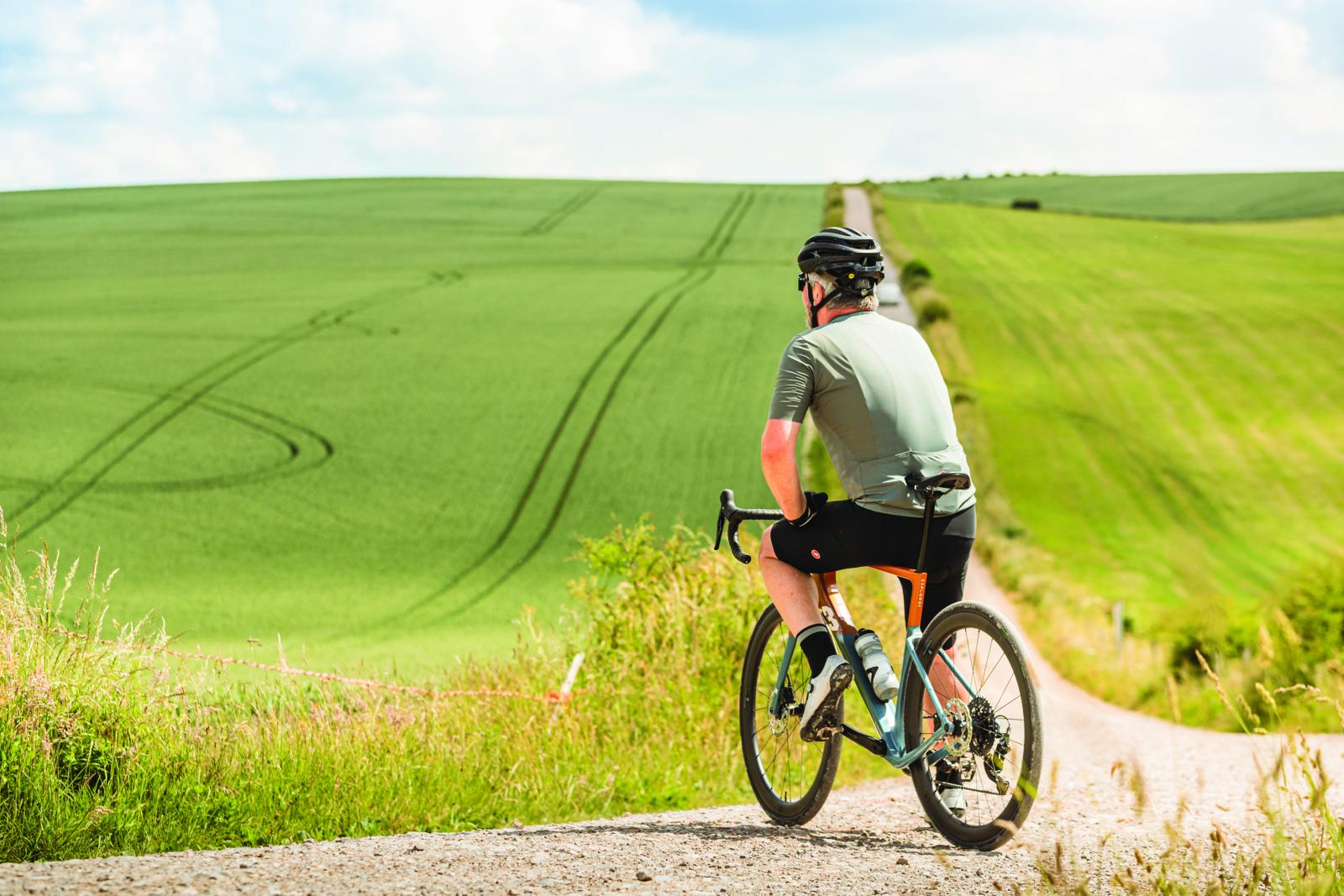The Atlas 8.9 Carbon follows on from the original alloy Atlas 6, integrating carbon into the mix.
Like the original bike, the latest Atlas is all about big-mileage adventuring. That’s not to say it’s not capable when the going gets testing, though.
The Atlas features every mount you could wish for, and Focus has even gone to the trouble of designing specific accessories and racks to get the most from the Atlas' load-carrying potential.
It turned out to be a very capable adventurer during my testing.
Focus Atlas 8.9 Carbon frame details
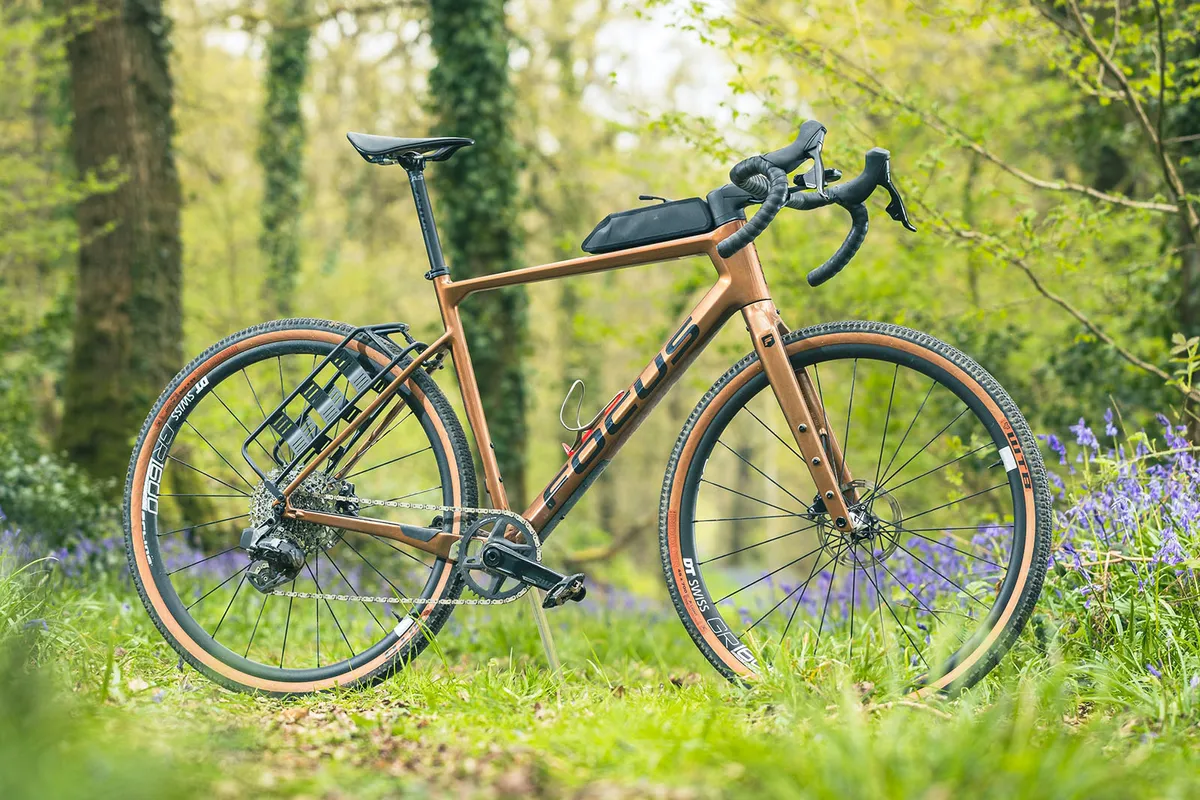
Focus says it paid particular attention to the Atlas' frame construction, using three types of carbon fibre to balance frame stiffness, durability and compliance.
It claims a 995g weight for a medium-sized frame, which sounds lighter than I’d have expected for such a burly design.
The thick, angular fork offers clearance for 700 x 45c tyres, or up to 2in wide in 650b diameter. This is matched by the frame via the asymmetric chainstays and widely spaced seatstays.
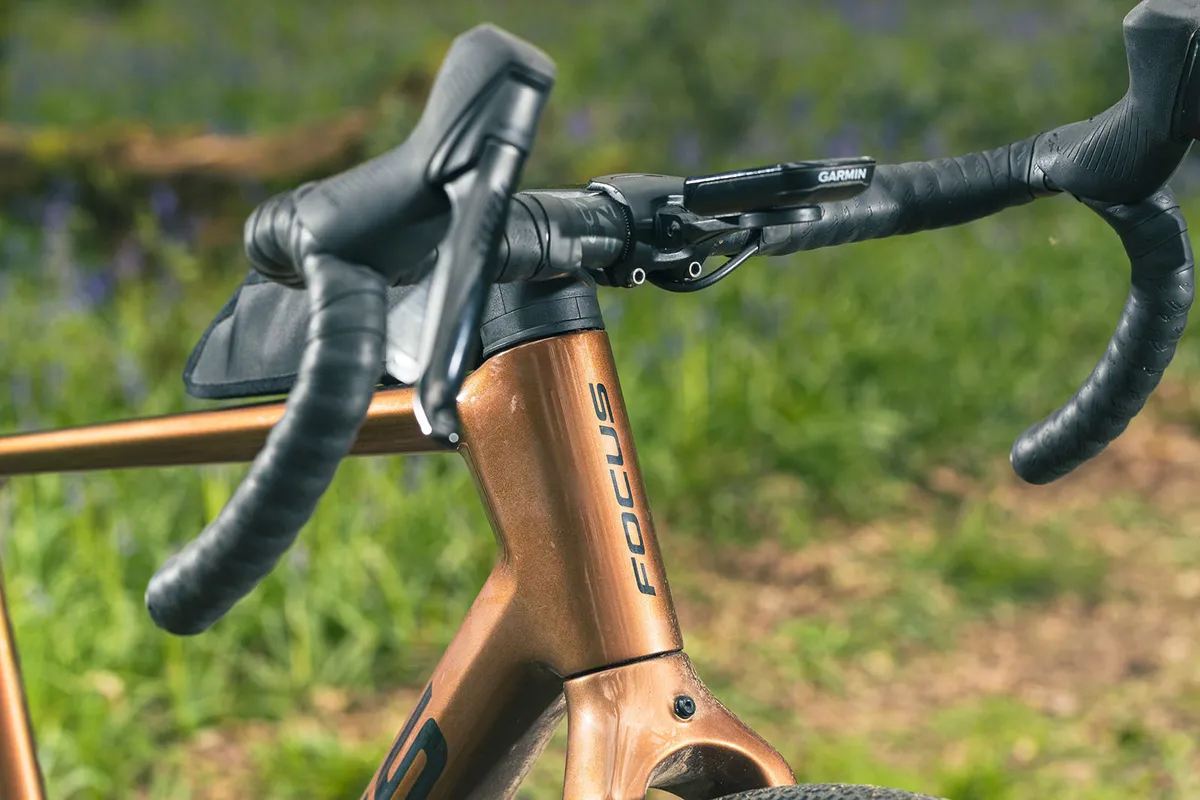
The head tube has a deep triangular-shaped junction with the huge down tube, while the flattened top tube is very reminiscent of Focus’ lightweight Izalco Max road machine.
The down tube itself has underside protection in the form of a rubberised plate that protects against rock and gravel strikes.
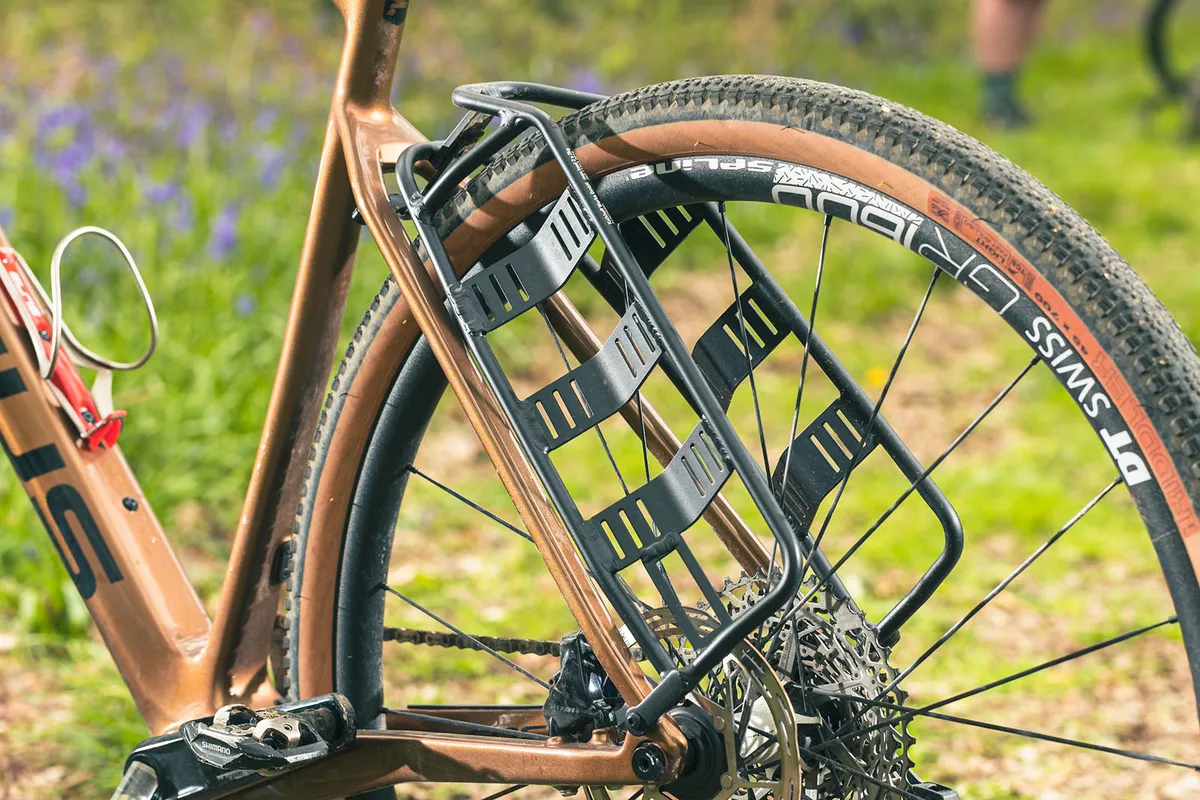
The PF86 bottom bracket’s shell is generously sized, but the seat tube contrasts with a slim profile.
This joins to slender seatstays, which are designed to offer some compliance at the rear.
Despite the slenderness, the rear triangle gets mounts aplenty with provision for a rear mudguard, a standard rear rack, or – like my test bike – equipped with Focus’ own rear adventure rack.
This mounts at the seatstay bridge, and attaches via extra-long bolts, leaving space so you can run mudguards at the same time through the same bosses.
You can increase carrying capacity by utilising the triple mounts on the front fork legs. Each side is rated to an adventure-rack matching 3kg carrying capacity.
Add in three sets of bottle bosses, with two position options on the down tube for larger frame bag compatibility, plus bento box mounts on the top tube, and you’re comprehensively covered for storage options.
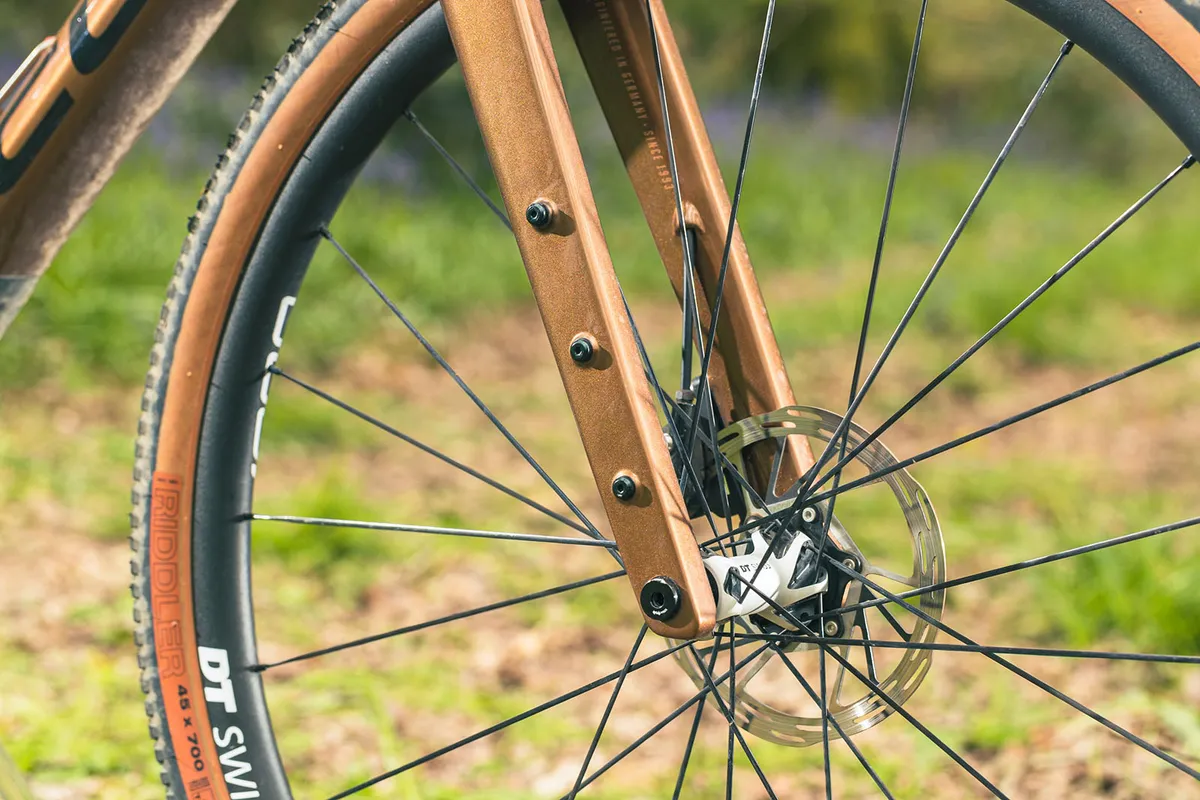
The Atlas frameset features full internal brake hose routing, plus internal dropper post compatibility thanks to the 27.2mm-diameter seat tube.
The routing itself leverages Focus’ C.I.S. (Cockpit Integration System), as found on the Izalco Max.
It’s a very similar design to those found on Cervélo’s Caledonia and Orbea’s Terra, with hoses routing externally at the bar before slotting into a cover on the stem’s underside and down through the head tube.
Fundamentally, it’s a tidy solution and it kept the hoses out of the way of my Wizard Works bar bag.
The main point of difference from most gravel bikes is the rear axle. Unlike the standard 142x12mm dimensions, Focus has adopted the wider 148x12mm standard from mountain bikes.
Focus claims this delivers better stability on rougher terrain and when the Atlas is loaded up, while it also claims wheels built to this wider standard are more resilient.
However, it means if you’re looking to upgrade or replace wheels down the line, you’ll ostensibly need to be looking at mountain bike wheels.
My XL test bike weighed in at 9.36kg with a top tube (bento box) bag and rear racks fitted.
Focus Atlas 8.9 Carbon geometry
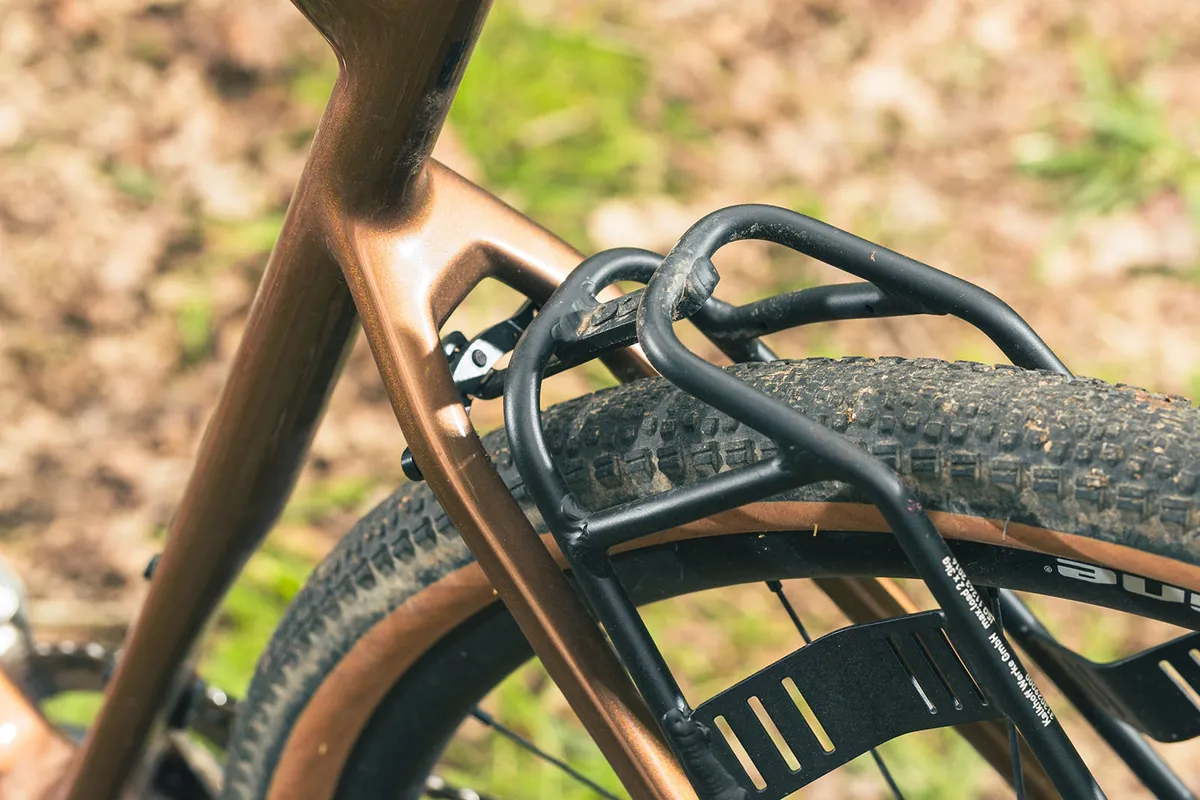
The Atlas’ geometry is well thought out for its intended purposes.
On my size XL (broadly 58cm equivalent), a long 420mm reach and tall 630mm stack is combined with a short 80mm stem.
The seat tube angle is a steep 73.5 degrees, pitching you over the bottom bracket, but it’s combined with a head angle that’s a more relaxed 70.5 degrees to relax the handling at the front.
The lengthy 1,088mm wheelbase is intended to bring stability, especially under load.
That said, the chainstays (at 425mm) are quite compact for such a bike, which translates into a degree of sharp reactivity.
| | XS | S | M | L | XL |
|---|---|---|---|---|---|
| Seat angle (degrees) | 74 | 73.5 | 73.5 | 73.5 | 73.5 |
| Head angle (degrees) | 70.5 | 70.5 | 70.5 | 70.5 | 70.5 |
| Chainstay (mm) | 425 | 425 | 425 | 425 | 425 |
| Seat tube (mm) | 445 | 485 | 515 | 545 | 585 |
| Top tube (mm) | 532 | 549 | 567 | 591 | 606 |
| Head tube (mm) | 115 | 120 | 130 | 150 | 180 |
| Fork offset (mm) | 50 | 50 | 50 | 50 | 50 |
| Bottom bracket drop (mm) | 75 | 75 | 75 | 75 | 75 |
| Wheelbase (mm) | 1,016 | 1,028 | 1,046 | 1,068 | 1,088 |
| Stack (mm) | 569 | 574 | 583 | 611 | 630 |
| Reach (mm) | 370 | 380 | 395 | 410 | 420 |
| Stem length (mm) | 80 | 90 | 90 | 90 | 100 |
| Crankarm length (mm) | 170 | 170 | 172.5 | 172.5 | 175 |
Focus Atlas 8.9 Carbon build
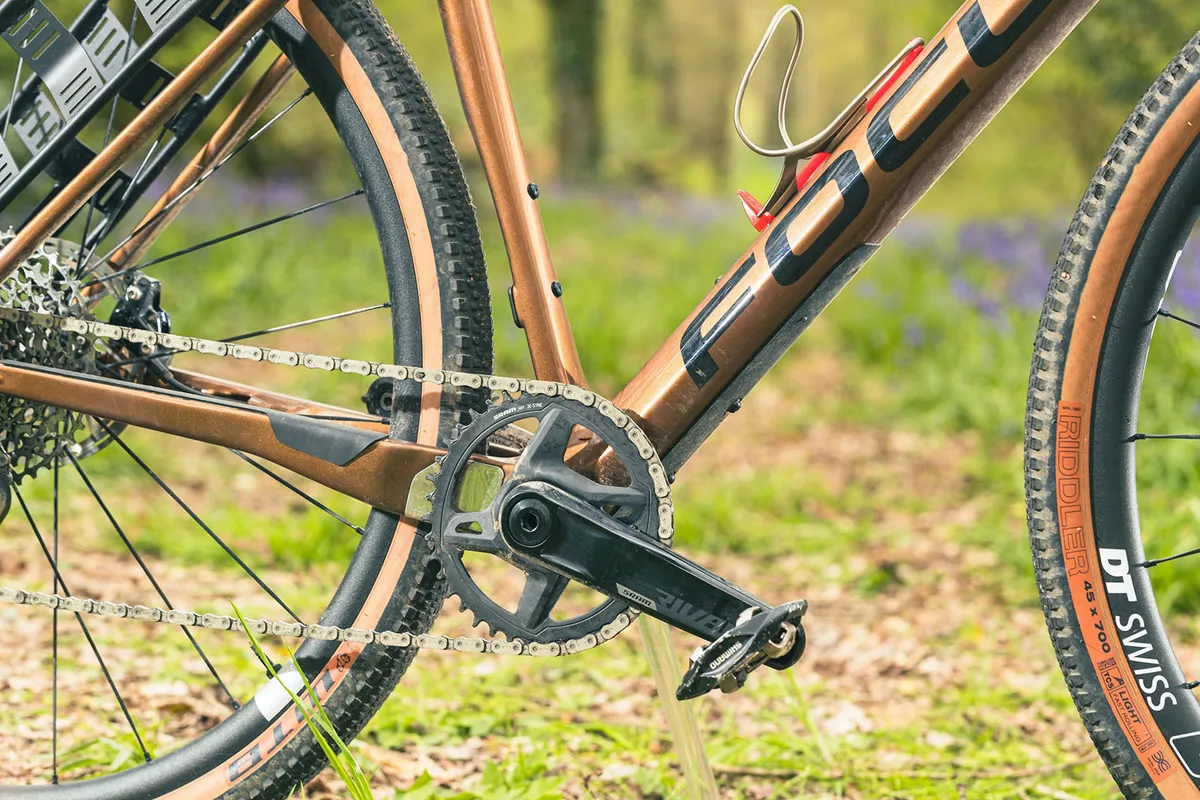
The Atlas runs on SRAM’s excellent Rival eTap AXS XPLR groupset.
A combination of a 40-tooth chainring and wide 10-44 tooth cassette offers a smallest gear well below 1:1 ratio, which should see you able to ascend the steepest gradients even with a fully laden bike.
Up front, Focus’s CIS stem clamps via its two-bolt hinged faceplate to an Easton EC70 carbon gravel bar. This features a compact 120mm drop and 80mm reach, and a 12-degree flare.
Easton also provides its carbon EC70 seatpost with a zero-degree offset. This is topped by Selle Italia’s Boost saddle.
It may only be the basic Model-X perch, but it delivers the same comfort as the Italian company’s more premium offerings.
The Atlas rolls on DT Swiss’ GR1600 wheels (one of the few gravel bike wheels available with BOOST rear spacing).
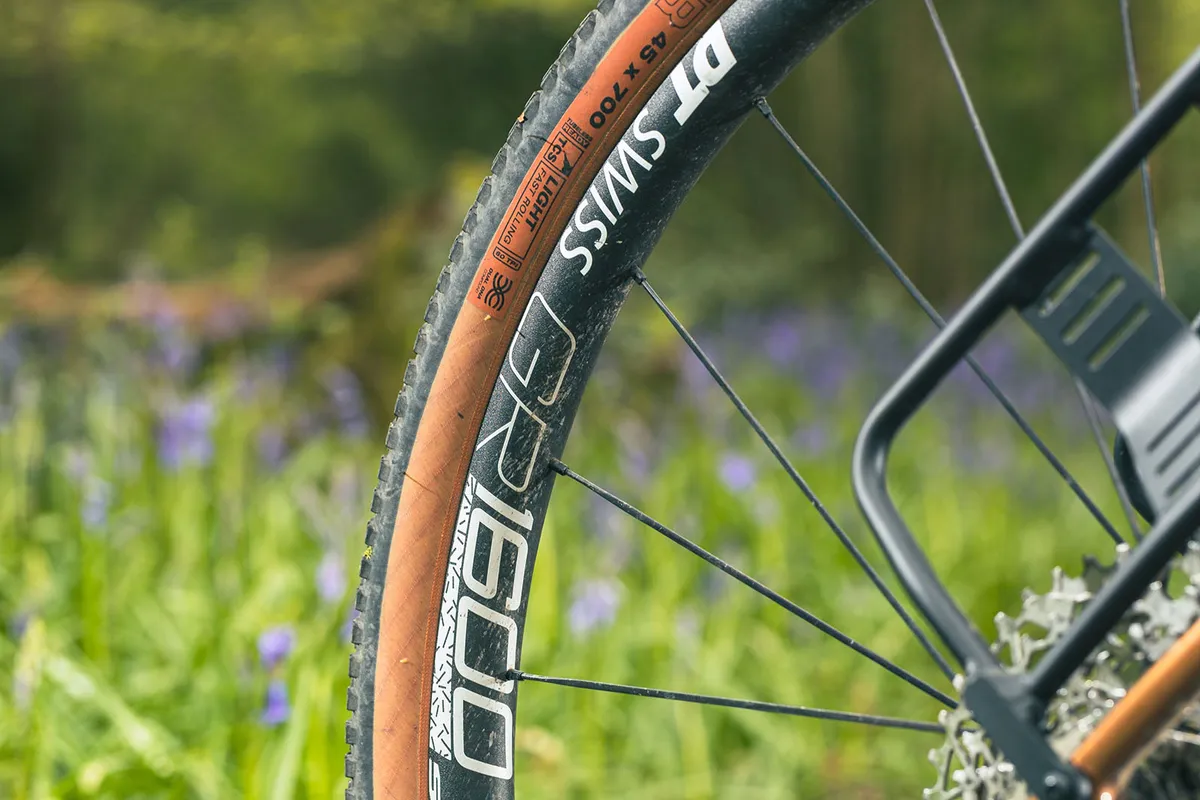
The GR’s aluminium rim is 28mm wide (externally) and just 25mm deep. The internal width of 24mm is suitable for any gravel bike tyre the Atlas frameset can accommodate.
The wheels are hand-assembled using DT Swiss’s 350 hub internals inside a very fetching silver/grey CNC-machined hub shell with DT’s straight-pull Spline design.
The 350 rear hub has a 36-point engagement, giving a 10-degree engagement angle. Broadly speaking, this is ideal for low-speed, high-torque pedalling, the sort of which many often engage in during gravel riding when tackling technical terrain or setting off on a heavily laden bike.
The wheels are rated to a 130kg system weight (incidentally, 10kg more than the bike’s limit, hinting towards a sturdy design).
At 1,750g for the pair, with rotor lockrings, tubeless tape and valves in place, they’re very much a ‘middleweight’ wheel.
The DTs are shod with WTB’s excellent Riddler tyre in a generous 45c width. Focus set the Atlas up tubeless, meaning I could make best use of tyre pressure adjustments without the fear of pinch punctures.
Focus Atlas 8.9 Carbon ride impressions
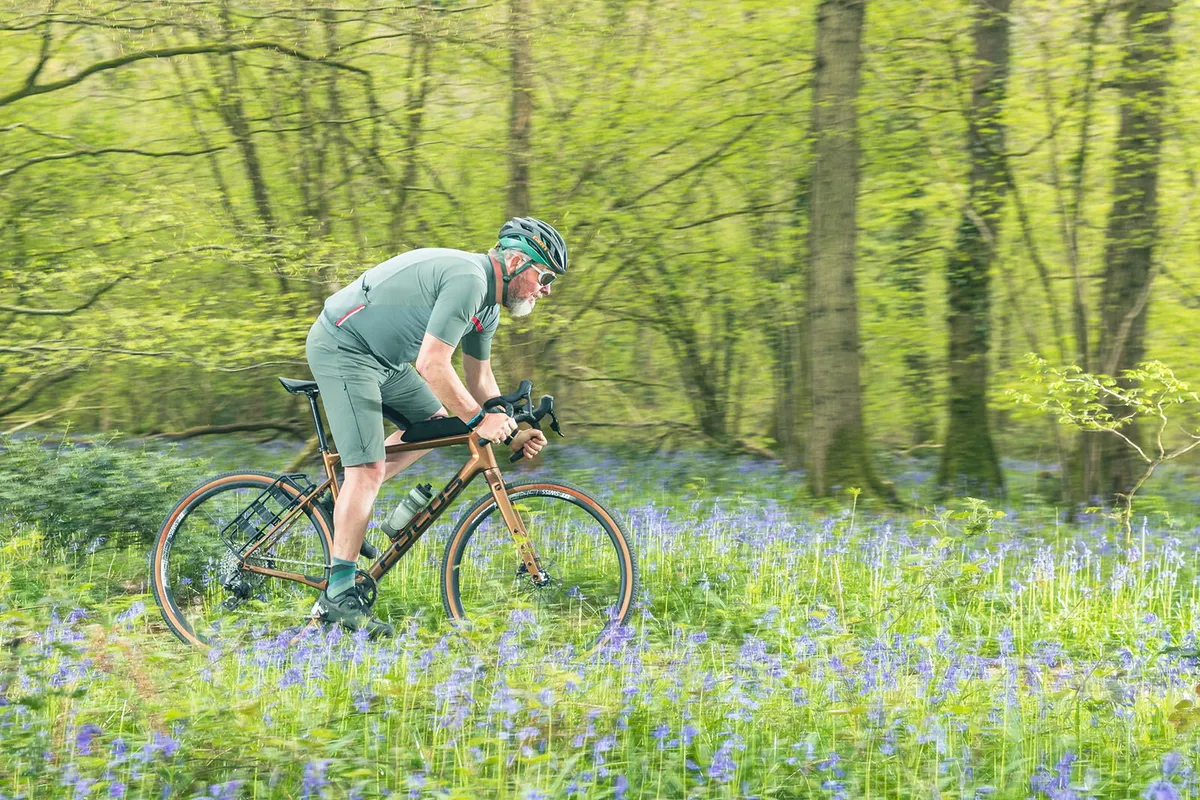
The Atlas is a robust rambler, but it still has plenty of fun in its overall character.
We’d all be forgiven for thinking a mile-eating machine such as the Atlas could be so stable as to miss some ride excitement. However, Focus has got the balance just about spot-on.
The relaxed head angle ensures the front-end tracks straight over the worst surfaces. It meets puddles, potholes and double-track ruts and ridges with assured confidence.
The steering responses (especially when descending) aren’t unduly compromised, but the use of a short stem and a wide bar provides bags of control.
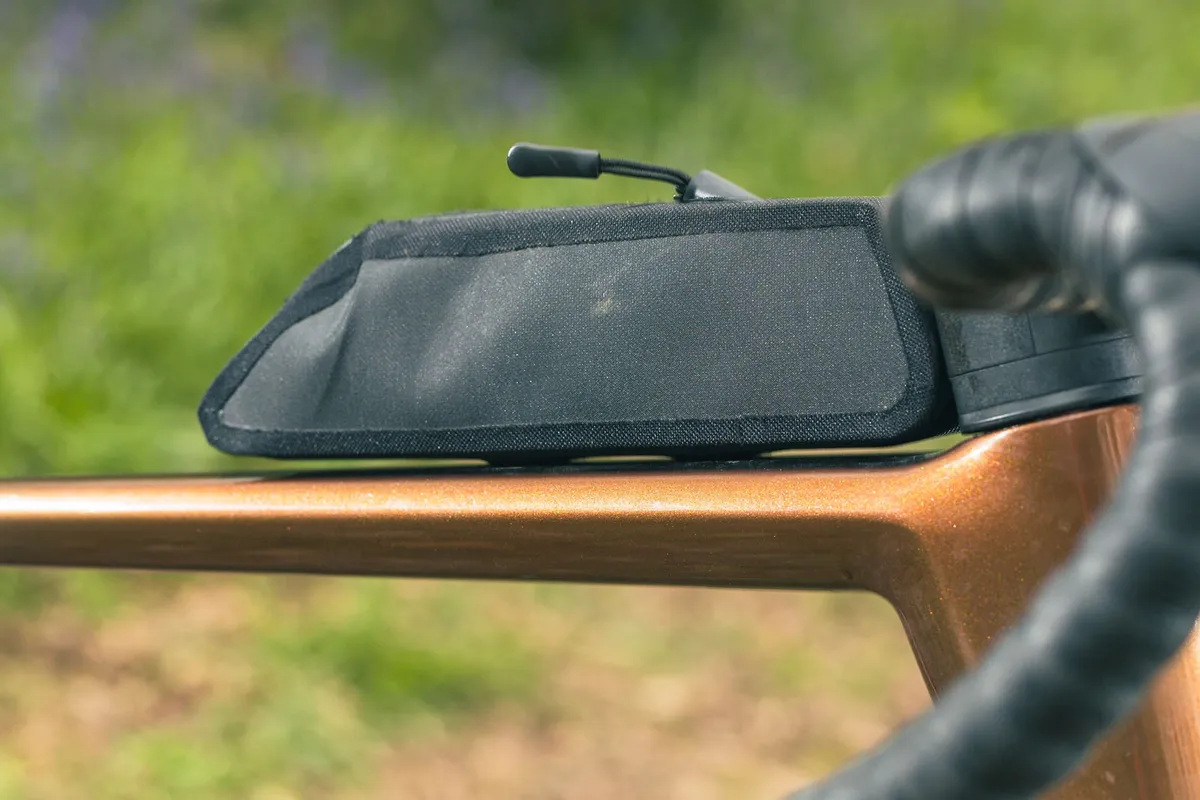
When you combine the poised handling with the great tyres and low running pressures, the Atlas takes everything in its stride, from rutted singletrack to over-worked and dried-out bridleway tracks.
Higher-volume tyres take the sting out of most surfaces, and the carbon bars and seatpost cope with lots of vibrations.
The underlying character of the Atlas frame, though, was still one of solidity and stiffness.
I really didn’t get much impression of the frame and fork doing any of the comfort-improving heavy lifting. Therefore, I wouldn’t want to reduce the tyre size for anything but the tamest of gravel surfaces, or for a long-distance adventure with plenty of tarmac.
That said, I was impressed by how well the Atlas coped on roads. Big-tyred bikes like this can feel somewhat sluggish on smooth roads, but the steep seat angle and zero-offset carbon post (which positions you further over the cranks than a setback post might) helped me deliver power efficiently.
The shifting from the long-cage Rival XPLR rear derailleur is excellent, quick in both directions, smooth and quiet. The 10-44t cassette range is well spaced over its 12 speeds, keeping the jumps smaller in the middle of the range, where I spent most of my time.
The EC70 AX carbon bar is superb. The short 80mm reach and compact 125mm drop results in a comfortable in-the-drops position and thus I spent a lot more time in them than I usually would.
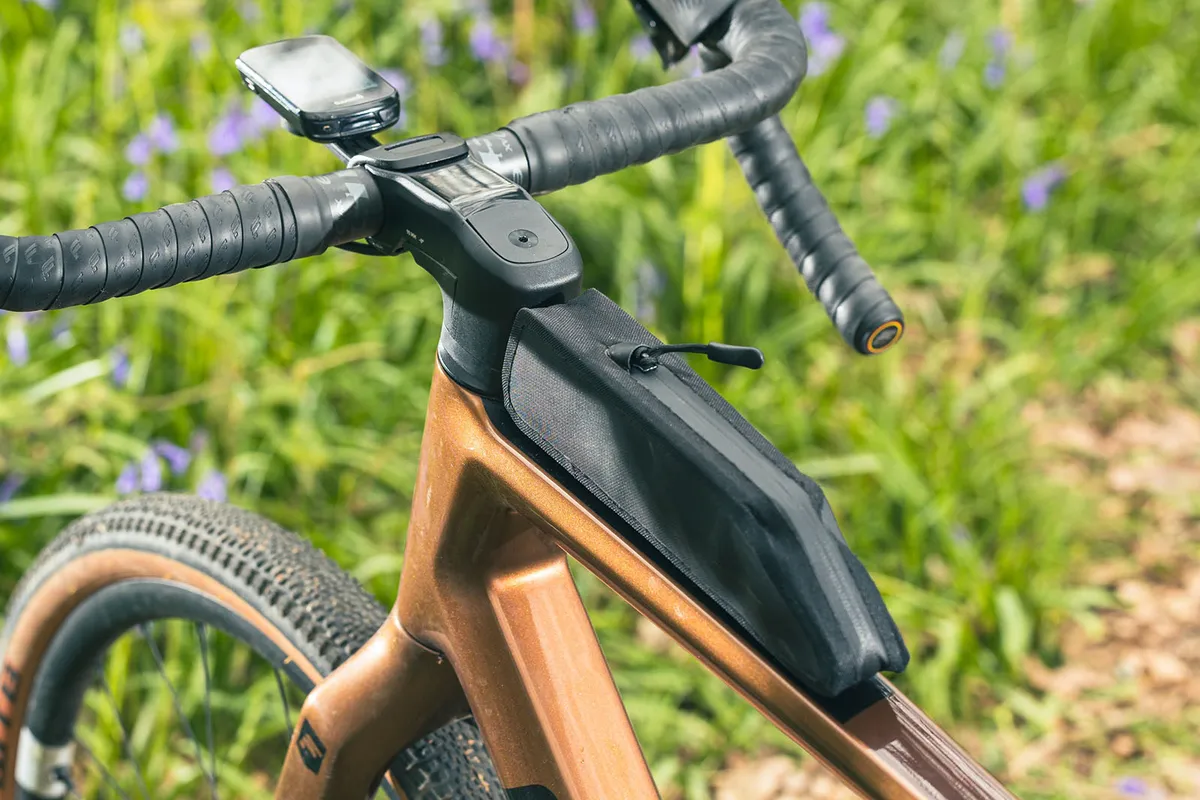
The oversized top section is a comfortable hold, and the subtle flare of the bar means plenty of wrist clearance too.
I’d like to try the Atlas with a gravel bike dropper post because the contact points, along with the tyres and geometry, make it a great bike for tricky technical descents thanks to its quick, responsive yet predictable handling.
After a few days riding in mixed conditions – two very wet days followed by a couple of sunny dry spring excursions, I got a recurring creak from the bottom bracket under out-of-the-saddle efforts.
It's worth noting that my test bike was showing signs of having done serious demo mileage, and was arguably due its first full service.
Although I’d have preferred this not to have been an issue at all, it’s hard to tell if this is a design flaw, or simply down to the hard life it’s had to date.
Focus Atlas Carbon 8.9 bottom line

The Atlas 8.9 is a bit of a workhorse chameleon and a bike for big adventures.
It’s happy to carry your possessions, and traverse on tarmac and unmetalled roads, ramble through woodlands, dales, and mountains, all the while covering ground with confidence.
It won’t embarrass itself if you decide that an excursion onto twisting singletrack or downhill thrill seeking is what you’re after.
The Atlas frameset is certainly firm, built to serve its Transcontinental-esque purposes. However, it’s very well specced to compensate for this.
Product
| Brand | focus |
| Price | 4299.00 EUR,4199.00 GBP |
| Weight | 9.3600, KILOGRAM (L) - |
Features
| Fork | Carbon, disc, internal brake cable routing, multiple mounting points |
| br_stem | FOCUS C.I.S. integrated, 31.8 mm, aluminium |
| br_chain | SRAM XG-1251, 12-speed |
| br_frame | Carbon, disc, C.I.S. integration |
| Tyres | WTB Riddler TCS, 700 x 45C, folding |
| br_brakes | SRAM Rival eTap AXS 160 / 160 mm rotors |
| br_cranks | SRAM Rival AXS wide, 12-speed, 40t |
| br_saddle | Selle Italia Boost |
| br_wheels | DT Swiss GR1600, 24-622, 25 mm height, front: 110x12 mm, rear: 148x12 mm |
| br_headset | ACROS IS 52/286-IS52/40 (ICR) |
| br_shifter | SRAM Rival eTap AXS, 12-speed |
| br_cassette | 10-44 |
| br_seatpost | Easton EC70, carbon, 27.2 mm |
| br_handlebar | Easton EC70 AX, carbon |
| br_bottomBracket | SRAM PF DUB 86 |
| br_availableSizes | XS, S, M, L, XL |
| br_rearDerailleur | SRAM Rival eTap AXS XPLR, 12-speed |
| Features | Available accessories GoPro mount: 2.99 € Computer mount Garmin / Wahoo: 29.95 € Fender set ATLAS 8. series: 25.99 € Adventure Rack: 39.99 € Top tube bag: 24.99 € |
